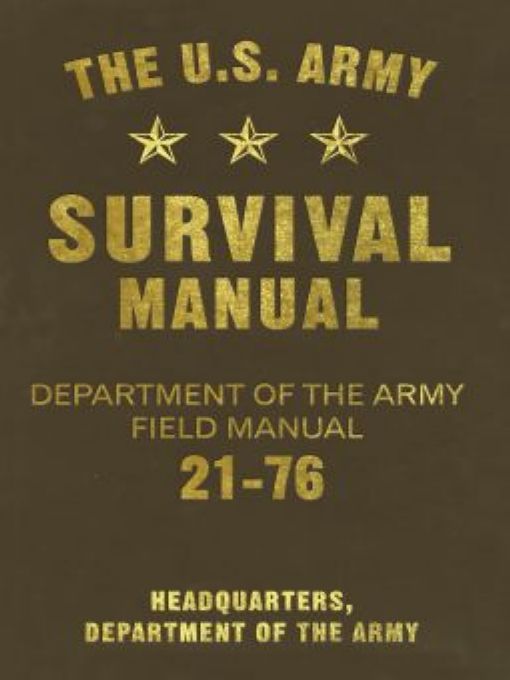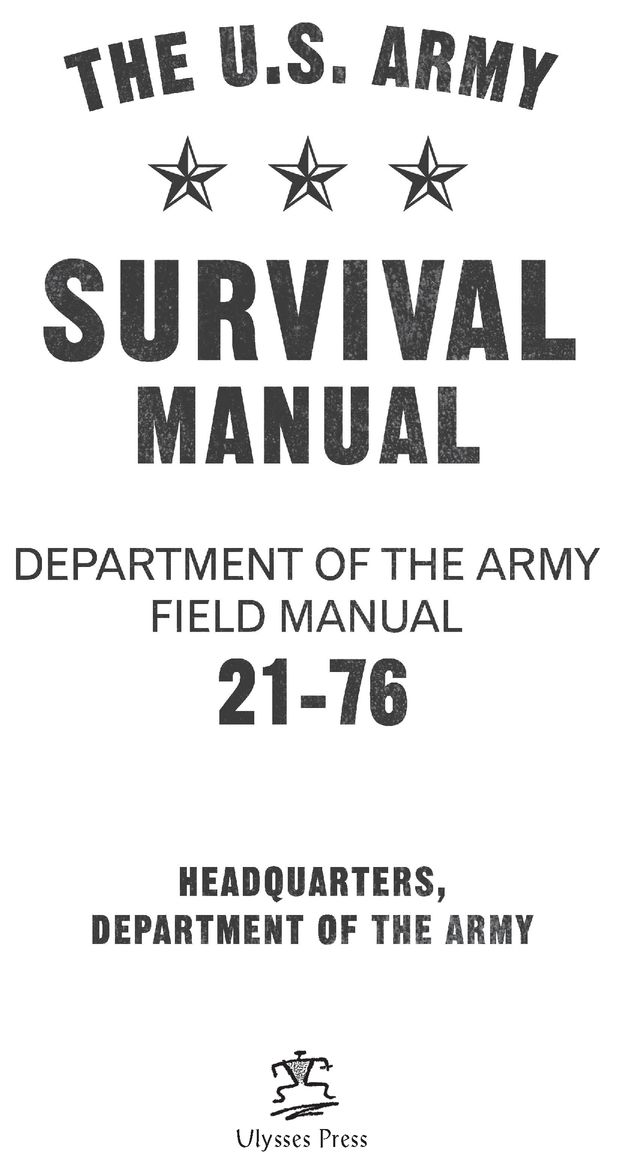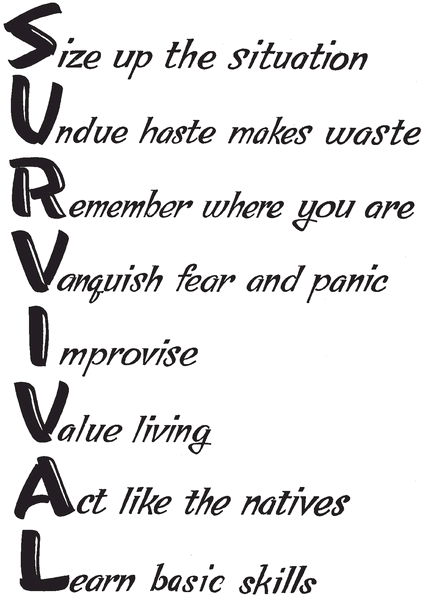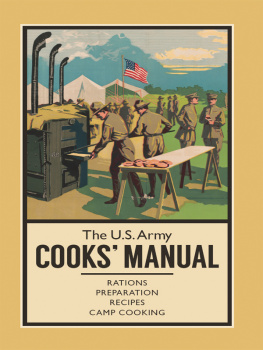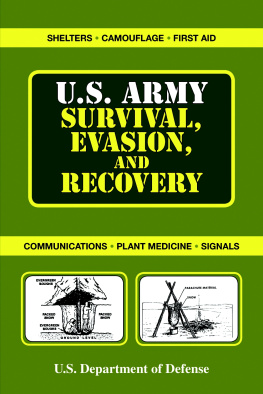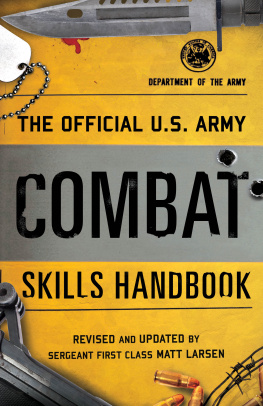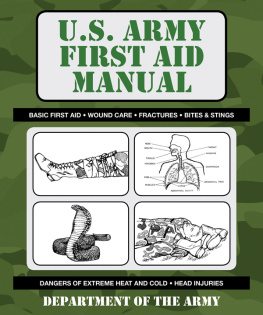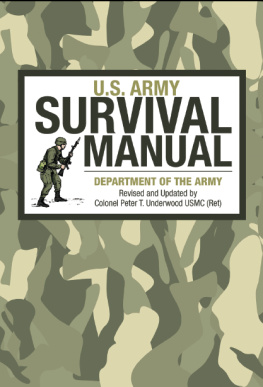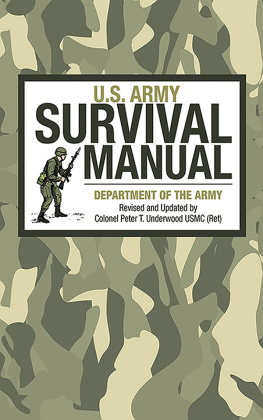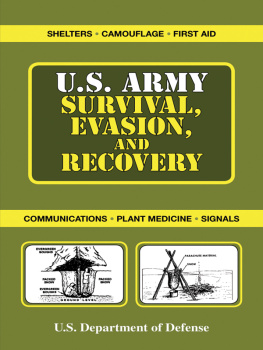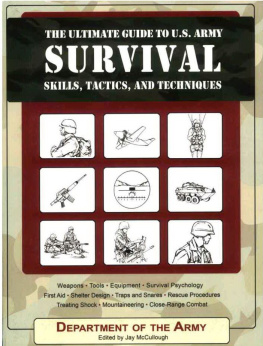Table of Contents
CHAPTER 1
INTRODUCTION
Section I. GENERAL
1. Purpose and Scope
a. Modern combat increases the likelihood of your becoming isolated and having to find water, food, and shelter for many dayseven weekswhile making it back to friendly forces. Small units fighting in widely dispersed formations or on special missions forward of friendly lines are more likely to be cut off than ever before. Large units traveling great distances by air and sea make survival in remote and desolate areas a real possibility for you. The ability to evade the enemy and to escape if captured, both basic requirements of the soldiers Code of Conduct, demands every survival skill you can master. The chances of being exposed to such an emergency are always present, especially when traveling, so survival techniques should be a part of your basic soldiering skills.
b. This manual has been written to help you acquire these skills. It tells how to travel, find water and food, shelter yourself from the weather, and care for yourself if you become sick or injured. This information is first treated generally and then applied specifically to such special areas as the Arctic, the desert, the jungle, and on the ocean.
c. Individual skills such as map reading, using a compass or other directional guides, scouting and patrolling, camouflage, first aid, sanitation, personal hygiene, and night vision provide a good foundation on which to build further survival skills. You should have a good general knowledge of them already, so they are repeated in this manual only as they apply to survival specifically.
d. You can remain alive anywhere in the world when you keep your wits. This is a major lesson in survival. Remember that nature and the elements are neither your friend nor your enemythey are actually disinterested. Instead, it is your determination to live and your ability to make nature work for you that are the deciding factors.
2. Field Skills
A knowledge of field skills, including woodcraft, firemaking, food and water sources, shelter devices, and navigational techniques is necessary for survival. A basic knowledge of woodcraft, for example, prevents wasting valuable time fishing with a hook when a spear or net made from materials at hand would do a better job. Your survival chances increase as your knowledge of field skills increases; as you improve your ability to improvise; and as you learn to apply the principles contained in this manual to your immediate situation.
Section II. Individual and Group Survival
3. The Will To Survive
a. General. The experiences of hundreds of servicemen isolated during World War II and Korean combat prove that survival is largely a matter of mental outlook, with the will to survive the deciding factor. Whether with a group or alone, you will experience emotional problems resulting from fear, despair, loneliness, and boredom. In addition to these mental hazards, injury and pain, fatigue, hunger, or thirst, tax your will to live. If you are not prepared mentally to overcome all obstacles and accept the worst, the chances of coming out alive are greatly reduced.
b. If you Are Alone. The shock of finding yourself isolated behind enemy lines, in a desolate area or in enemy hands can be reduced or even avoided if you remember the keyword S-U-R-V-I-V-A-L ().
1.
Ssize up the situation by considering yourself, the country, and the enemy.
a. Yourself. Hope for the best but be prepared for the worst. Recall survival training and expect it to work. After all, you have been through this before and the only difference is that this is the real thing. In this way you will increase your chances for success by being confident that you can survive. Get to a safe, comfortable place as quickly as possible. Once there look things over, think, and form a plan. Your fear will lessen; your confidence increase. Be calm. Take it easy until you know where you are and where you are going.
b. The Country. Part of your fear may come from being in strange country; therefore, try to determine where you are by landmarks, compass directions, or by recalling intelligence information passed on to you by your leaders.
c. The Enemy. Put yourself in the enemys shoes. What would you do? Watch the enemys habits and routines. Base your plan on your observation. Remember, you know where the enemy is but he does not know where you are.
2.
Uundue haste makes waste.
a. Dont be too eager to move. It will make you careless and impatient. You begin to take unnecessary risks and you might end up like these men
1.. All that was on my mind was to get away, so I just rushed headlong without any plan. I tried to travel at night, but I just injured myself further by bumping into trees and fences. Instead of laying low and trying to evade the enemy, I fired at them with my carbine and was caught the second time.
2.. I became very impatient. I had planned to wait until night but could not. I left the ditch about noon and walked until I was captured.
b. Dont lose your temper. It may cause you to stop thinking. When something irritating happens, stop. Take a deep breath and relax; start over.
c. Face the factsdanger does exist. To try to convince yourself otherwise only adds to the danger. Dont be like the soldier who was captured by a child because he thought, Capture is the last thing I have to worry about. This is merely a game. It really is not happening to me.
3. Rremember where you are. You may give yourself away because you are used to acting in a certain way. Doing what comes naturally may be the tipoff that you dont belong there. One soldier, captured because he whistled a song, reported, Everything had been going well on the train. Suddenly an ugly little woman started whistling Tipperary. Immediately, I unconsciously began to whistle with her. It gave me away. If he had been one of the enemy the chances are he would not have known the song.
4.
Vvanquish fear and panic.
a. To feel fear is normal and necessary. It is natures way of giving you that extra shot of energy just when you need it. Learn to recognize fear for what it is and control it. Look carefully at a situation and determine if your fear is justified. When you investigate you will usually find many of your fears unreal.
b. When you are injured and in pain, it is difficult to control fear. Pain sometimes turns fear into panic and causes a person to act without thinking. One pilot, downed during World War II, might have saved himself had he been able to stop and think when his parachute caught in a tree and he was suspended head down, his foot tangled in the webbing. Unfortunately, the pilots head touched an ant hill and biting ants immediately swarmed over him. In desperation he pulled his gun and fired five rounds into the webbing holding his foot. When he did not succeed in breaking the harness by shooting at it, he placed the last shot in his head.
c. Panic can also be caused by loneliness. It can lead to hopelessness, thoughts of suicide, and carelessnesseven capture or surrender. Recognizing these signs help you overcome panic.

